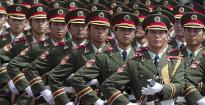Chinese Defense Industry Underwhelms
 The Washington Post reports:
The Washington Post reports:
MOSCOW - The Moscow Machine-Building Enterprise Salyut on the east side of town has put up a massive Soviet-style poster advertising its need for skilled workers. The New Year's party at the Chernyshev plant in a northwest suburb featured ballet dancers twirling on the stage of its Soviet-era Palace of Culture.
The reason for the economic and seasonal cheer is that these factories produce fighter-jet engines for a wealthy and voracious customer: China. After years of trying, Chinese engineers still can't make a reliable engine for a military plane.
The country's demands for weapons systems go much further. Chinese officials last month told Russian Defense Minister Anatoly E. Serdyukov that they may resume buying major Russian weapons systems after a several-year break. On their wish list are the Su-35 fighter, for a planned Chinese aircraft carrier; IL-476 military transport planes; IL-478 air refueling tankers and the S-400 air defense system, according to Russian news reports and weapons experts.
This persistent dependence on Russian arms suppliers demonstrates a central truth about the Chinese military: The bluster about the emergence of a superpower is undermined by national defense industries that can't produce what China needs. Although the United States is making changes in response to China's growing military power, experts and officials believe it will be years, if not decades, before China will be able to produce a much-feared ballistic missile capable of striking a warship or overcome weaknesses that keep it from projecting power far from its shores.
"They've made remarkable progress in the development of their arms industry, but this progress shouldn't be overstated," said Vasily Kashin, a Beijing-based expert on China's defense industry. "They have a long tradition of overestimating their capabilities."
Ruslan Pukhov, the director of the Center for Analysis of Strategic Technologies and an adviser to Russia's ministry of defense, predicted that China would need a decade to perfect a jet engine, among other key weapons technologies. "China is still dependent on us and will stay that way for some time to come," he said.
Indeed, China has ordered scores of engines from the Salyut and Chernyshev factories for three of its new fighters - the J11B, a Chinese knock-off of the Russian Su-27; the J10, which China is believed to have developed with Israeli help; and the FC1, which China modeled on an aborted Soviet design. It also told Russia that it wants a third engine from another factory for the Su-35.

